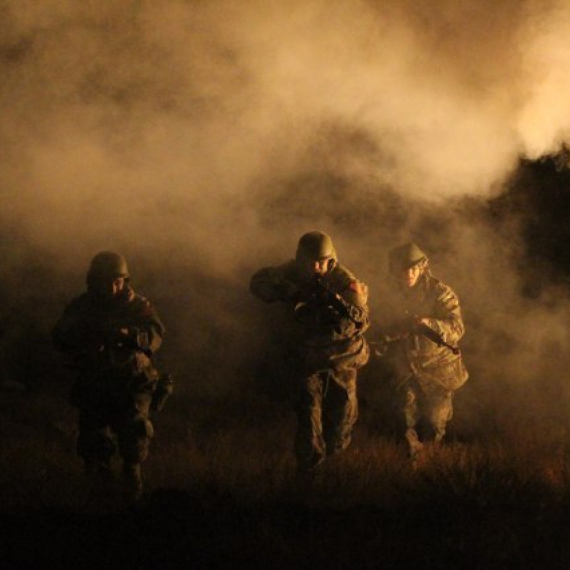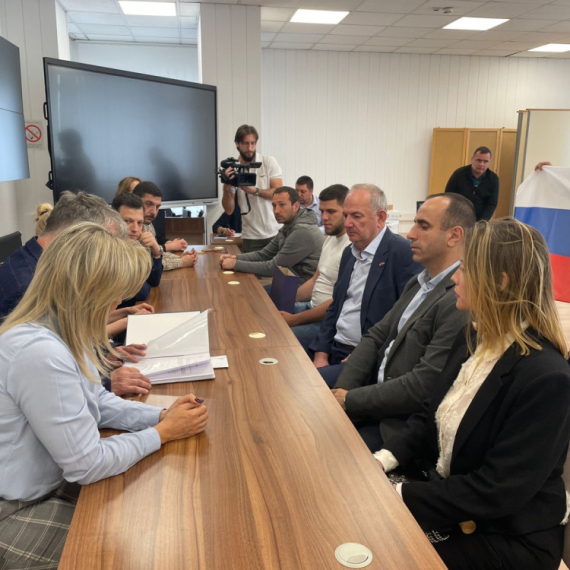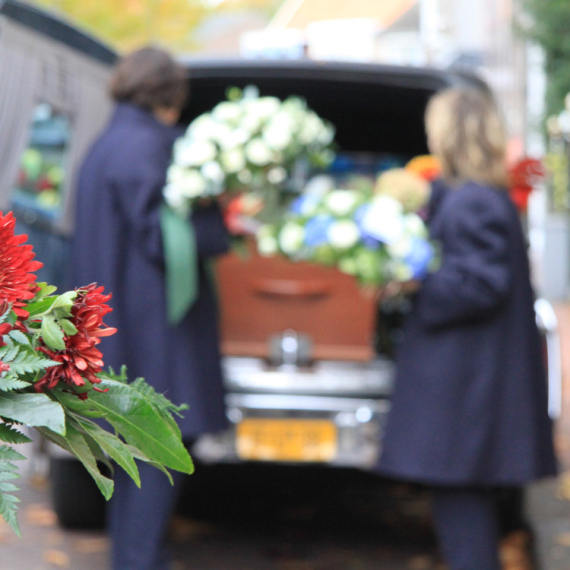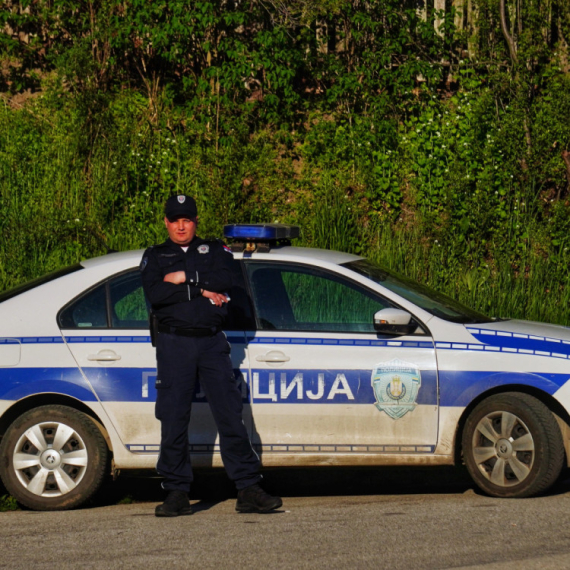Prime minister meets with EP rapporteur
Serbian Prime Minister Ivica Dačić conferred with European Parliament (EP) Rapporteur for Serbia Jelko Kacin in Belgrade on Friday.
Friday, 10.01.2014.
11:59

BELGRADE Serbian Prime Minister Ivica Dacic conferred with European Parliament (EP) Rapporteur for Serbia Jelko Kacin in Belgrade on Friday. They addressed a joint news conference after the meeting. Dacic said that the issue of the holding of early parliamentary elections in Serbia was not discussed with Kacin. Prime minister meets with EP rapporteur “We did not discuss elections. I have said a hundred times that the elections are a matter for parties and not the government. The government has to work and we cannot sit and wait for the elections to be held or not,” he said. Kacin confirmed this, and said that "Plan A or Plan B would be applied depending on whether elections will take place in Serbia," and added: "If there are elections I hope that Tanja Miscevic will be coming to Brussels and that we will continue the talks." The news conference also touched on the constituting of Serb municipalities in Kosovo, which should happen today. The dispute stems from Pristina's insistence that mayors and councilors take oath according to Kosovo's laws, while Belgrade and Serbs from northern Kosovo insist on status-neutrality of the proceedings. Kacin commented by saying that it was "against the grain that Serbs in Kosovo are incapable of forming local self-governments," and called on them "to use every opportunity that is being offered to them." Dacic said that in order to overcome the difficulties with the setting up of municipalities in Kosovo where Serbs are a majority, working groups are meeting in Brussels today, and added that the subject was being given more attention than it deserved. During the day, Kacin will also meet with First Deputy Prime Minister Aleksandar Vucic, Serbia's lead negotiator with the EU Tanja Miscevic and other officials. The EP rapporteur is paying a visit to Belgrade ahead of the adoption of a report on Serbia's progress in the EU integration process in the EP on January 16. The draft resolution on Serbia, which Kacin has prepared on the behalf of the Committee on Foreign Affairs, commends the Serbian government for its commitment in the EU integration process and encourages it to continue to implement reforms, particularly in the areas of judiciary, the fight against corruption, public administration, protection of minorities and vulnerable groups, and freedom of the media. The document also states satisfaction over the Brussels agreement and calls on the authorities in Belgrade and Pristina to maintain a constructive approach and continue with the implementation of all agreements reached to date. The draft resolution also points to the EP's support to the visa liberalization for the Western Balkan countries and urges the EU member states not to abuse the visa waiver suspension mechanism. (Beta) "No danger" Serbia is in no danger of the visa-free regime being suspended, and has the capacities to resolve the issue of false asylum seekers, Jelko Kacin said on Friday, adding that EU member countries too must work to solve the problem. "Things are under control, but efforts must be made persistently, particularly against those who are involved in trafficking and want to make quick profits," Kacin told the joint press conference. Kacin pointed out that Serbia has "so much knowledge and so many reasons to feel proud of itself, and to believe that it has the capacities to solve this problem." He said that he is confident that the Serbian prime minister, who is also minister of interior, will do everything he can and that he will not allow the visa regime to be reinstated for Serbia. Kacin said that the EP will on January 16 discuss his report on Serbia's progress in European integrations, which calls on Germany to declare Serbia a safe country of origin with regards to false asylum seekers. He said that the report has received the support of all 47 members of the EP Committee on International Affairs, "without a single vote against it." "The German colleagues who will be participating in the debate will not be enthusiastic about the amendment, but we have the courage to urge Germany to offer support to other EU member countries by its own example," the EP rapporteur said. Not everything depends on Serbia and the other countries the false asylum seekers are coming from, Kacin said, adding that EU member countries themselves must do "their share of the work." "That is why we have called for an amendment that would reduce the danger of the visa-free regime being suspended," Kacin explained. "Two crucial events" Ivica Dacic stated on Friday that there are two crucial events for Serbia in January - the formal beginning of the EU accession talks and the presentation of the most positive report to date in the European Parliament (EP) on Serbia's EU integration progress. At a joint press conference with EP Rapporteur Jelko Kacin, Dacic said that Kacin's report, which will be presented on January 16, will be the most positive in the last few years. The second historic event is the first session of the intergovernmental conference in Brussels on January 21, which will officially mark the start of Serbia's EU membership talks, he said. Dacic underlined that First Deputy Prime Minister Aleksandar Vucic and he will head the Serbian delegation, EU Enlargement Commissioner Stefan Fuele will represent the European Commission, and the conference will be chaired by the Greek minister of foreign affairs. The sessions of the intergovernmental conference will be held four times a year, he said. “At the first session of the intergovernmental conference, the EC will present its negotiating framework, and we will present ours and this will mark the end of the first session. It has been constantly repeated in Serbia that the negotiating framework is a kind of a secret, but actually these are the procedures of the EU. Our teams are ready and we are seriously preparing for the talks,” Dacic said. The prime minister pointed out that Serbia has already entered the screening process, adding that the opening of Chapter 35 is expected in the coming days. “This means many obligations for us such as the continuation of the dialogue with Pristina, which is a daily topic and a nightmare. At the moment, the working groups are in Brussels discussing difficult issues,” Dacic said, adding that each topic is being politicized, and therefore calls for a lot of balancing. He said that the dialogue with Pristina is the basic political criteria which will influence the development of the accession talks. “We have reached the end of a difficult beginning, and we will see at what speed we will go on in the process. Our country wants the accession process to be not only fast, but also successful. When you sum up the EP report with the reports by the European Commission and the European Council, the year 2013 was very successful,” Dacic said. Rapporteur Kacin congratulated Serbia on everything it has done in the EU integration process, stressing that this is a visible progress which has enabled Serbia to do all by itself and prove to itself that it can obtain a date for the beginning of the accession talks. “Serbia is an engine of the Western Balkans' approach to the EU and an engine of the normalization of the situation in the entire region,” Kacin said. Kacin said that the first session of the intergovernmental conference is a historic event and a turning point in Serbia's relations with the EU. Kacin stated that 47 members of the EP Committee on Foreign Affairs adopted the report on Serbia's progress unanimously. Beta Tanjug
Prime minister meets with EP rapporteur
“We did not discuss elections. I have said a hundred times that the elections are a matter for parties and not the government. The government has to work and we cannot sit and wait for the elections to be held or not,” he said.Kacin confirmed this, and said that "Plan A or Plan B would be applied depending on whether elections will take place in Serbia," and added:
"If there are elections I hope that Tanja Miščević will be coming to Brussels and that we will continue the talks."
The news conference also touched on the constituting of Serb municipalities in Kosovo, which should happen today. The dispute stems from Priština's insistence that mayors and councilors take oath according to Kosovo's laws, while Belgrade and Serbs from northern Kosovo insist on status-neutrality of the proceedings.
Kacin commented by saying that it was "against the grain that Serbs in Kosovo are incapable of forming local self-governments," and called on them "to use every opportunity that is being offered to them."
Dačić said that in order to overcome the difficulties with the setting up of municipalities in Kosovo where Serbs are a majority, working groups are meeting in Brussels today, and added that the subject was being given more attention than it deserved.
During the day, Kacin will also meet with First Deputy Prime Minister Aleksandar Vučić, Serbia's lead negotiator with the EU Tanja Miščević and other officials.
The EP rapporteur is paying a visit to Belgrade ahead of the adoption of a report on Serbia's progress in the EU integration process in the EP on January 16.
The draft resolution on Serbia, which Kacin has prepared on the behalf of the Committee on Foreign Affairs, commends the Serbian government for its commitment in the EU integration process and encourages it to continue to implement reforms, particularly in the areas of judiciary, the fight against corruption, public administration, protection of minorities and vulnerable groups, and freedom of the media.
The document also states satisfaction over the Brussels agreement and calls on the authorities in Belgrade and Priština to maintain a constructive approach and continue with the implementation of all agreements reached to date.
The draft resolution also points to the EP's support to the visa liberalization for the Western Balkan countries and urges the EU member states not to abuse the visa waiver suspension mechanism.
"No danger"
Serbia is in no danger of the visa-free regime being suspended, and has the capacities to resolve the issue of false asylum seekers, Jelko Kacin said on Friday, adding that EU member countries too must work to solve the problem."Things are under control, but efforts must be made persistently, particularly against those who are involved in trafficking and want to make quick profits," Kacin told the joint press conference.
Kacin pointed out that Serbia has "so much knowledge and so many reasons to feel proud of itself, and to believe that it has the capacities to solve this problem."
He said that he is confident that the Serbian prime minister, who is also minister of interior, will do everything he can and that he will not allow the visa regime to be reinstated for Serbia.
Kacin said that the EP will on January 16 discuss his report on Serbia's progress in European integrations, which calls on Germany to declare Serbia a safe country of origin with regards to false asylum seekers.
He said that the report has received the support of all 47 members of the EP Committee on International Affairs, "without a single vote against it."
"The German colleagues who will be participating in the debate will not be enthusiastic about the amendment, but we have the courage to urge Germany to offer support to other EU member countries by its own example," the EP rapporteur said.
Not everything depends on Serbia and the other countries the false asylum seekers are coming from, Kacin said, adding that EU member countries themselves must do "their share of the work."
"That is why we have called for an amendment that would reduce the danger of the visa-free regime being suspended," Kacin explained.
"Two crucial events"
Ivica Dačić stated on Friday that there are two crucial events for Serbia in January - the formal beginning of the EU accession talks and the presentation of the most positive report to date in the European Parliament (EP) on Serbia's EU integration progress.At a joint press conference with EP Rapporteur Jelko Kacin, Dačić said that Kacin's report, which will be presented on January 16, will be the most positive in the last few years.
The second historic event is the first session of the intergovernmental conference in Brussels on January 21, which will officially mark the start of Serbia's EU membership talks, he said.
Dačić underlined that First Deputy Prime Minister Aleksandar Vučić and he will head the Serbian delegation, EU Enlargement Commissioner Stefan Fuele will represent the European Commission, and the conference will be chaired by the Greek minister of foreign affairs.
The sessions of the intergovernmental conference will be held four times a year, he said.
“At the first session of the intergovernmental conference, the EC will present its negotiating framework, and we will present ours and this will mark the end of the first session. It has been constantly repeated in Serbia that the negotiating framework is a kind of a secret, but actually these are the procedures of the EU. Our teams are ready and we are seriously preparing for the talks,” Dačić said.
The prime minister pointed out that Serbia has already entered the screening process, adding that the opening of Chapter 35 is expected in the coming days.
“This means many obligations for us such as the continuation of the dialogue with Priština, which is a daily topic and a nightmare. At the moment, the working groups are in Brussels discussing difficult issues,” Dačić said, adding that each topic is being politicized, and therefore calls for a lot of balancing.
He said that the dialogue with Priština is the basic political criteria which will influence the development of the accession talks.
“We have reached the end of a difficult beginning, and we will see at what speed we will go on in the process. Our country wants the accession process to be not only fast, but also successful. When you sum up the EP report with the reports by the European Commission and the European Council, the year 2013 was very successful,” Dačić said.
Rapporteur Kacin congratulated Serbia on everything it has done in the EU integration process, stressing that this is a visible progress which has enabled Serbia to do all by itself and prove to itself that it can obtain a date for the beginning of the accession talks.
“Serbia is an engine of the Western Balkans' approach to the EU and an engine of the normalization of the situation in the entire region,” Kacin said.
Kacin said that the first session of the intergovernmental conference is a historic event and a turning point in Serbia's relations with the EU.
Kacin stated that 47 members of the EP Committee on Foreign Affairs adopted the report on Serbia's progress unanimously.




























































Komentari 1
Pogledaj komentare